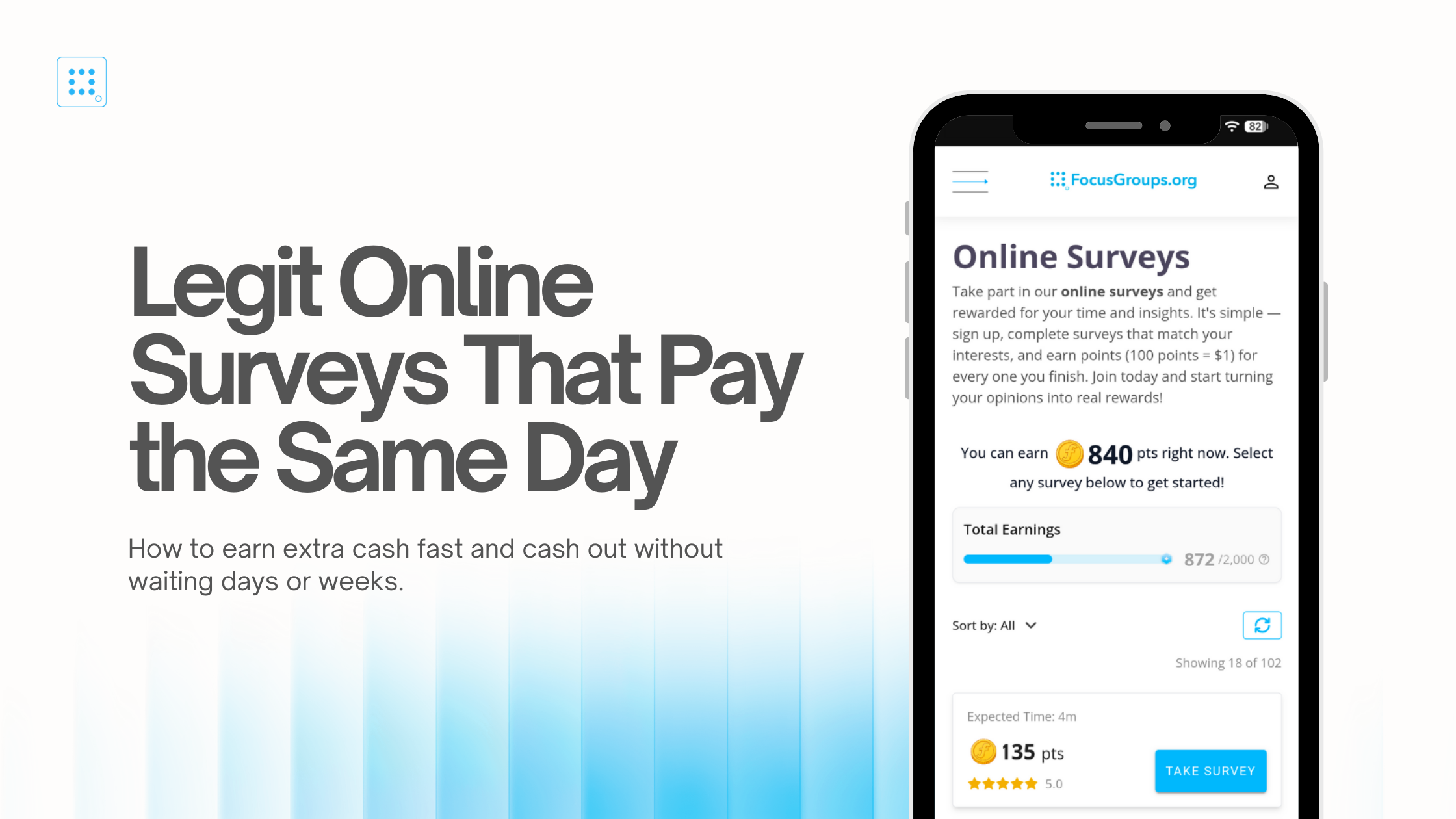Focus Group Basics: How to Earn Money Sharing Your Thoughts
If you're new to focus groups, this post is your guide to the process. We'll explain exactly what focus groups are. You'll get insider tips on what to expect, how to prepare, and etiquette to follow as a beginner.

Hey there! Do you ever feel like your hard-earned money disappears way too fast? Between bills, groceries, and other expenses, it's tough to get ahead nowadays.
We totally get it. We're all looking for legitimate ways to earn some extra cash. Well, listen up because we've got an intriguing option for you: focus groups.
Now we know you're probably thinking: "Focus groups? What are those?" Don't worry – we've got you covered. We'll walk you through exactly what focus groups are, how they work, and how you can start making money by sharing your opinions with them.
Stick with us, and you'll have all the inside tips you need to start landing focus group gigs and padding your wallet. Trust us, it's easier than you think! Let's get started...
What Are Focus Groups?
Focus groups are a type of small group discussion led by a moderator. Usually 6-12 people participate who match the profile of the intended target audience.
In a focus group, participants give feedback and share their thoughts on things like new products or services, ad campaigns, branding ideas, package designs, and more.
It's an interactive conversation where people are encouraged to speak openly and give their honest opinions. The goal is to get candid insights directly from the consumers who would use the product or service.
By testing ideas out in a real-world conversational setting, businesses can gain invaluable consumer perspectives. The organic back-and-forth of a focus group discussion helps bring out useful information that people might not express in a one-on-one interview or on a survey.

The Key Benefits of Focus Groups
Focus groups provide several core benefits for businesses looking to understand their target audience. First, they gain an in-depth understanding of consumer attitudes, perceptions, and preferences from the source – actual target customers speaking openly.
Second, focus groups allow businesses to hear constructive feedback in the participants' own words rather than through surveys or data. This qualitative insight is invaluable.
Third, by interacting in person or over video chat, the company can observe body language and other non-verbal reactions to their ideas. Subtle facial expressions or gestures may reveal additional insights.
Finally, the back-and-forth dialogue of a focus group fosters an open conversation that uncovers nuances that quantitative data may miss. The interactive format provides an opportunity to clarify responses and dig deeper into key themes.
Who Participates in Focus Groups?
Focus group participants are everyday consumers who match a particular demographic profile that companies want to target.
For example, a focus group could consist entirely of women ages 35-45. Or it could be made up of teenage video gamers. Parents of young children or retired professionals are other examples of specific profiles.
The goal is to recruit people who closely match the end-user or purchaser of the product or service. Companies want authentic viewpoints from real potential customers who would genuinely use or purchase what they are testing.
By carefully screening and selecting participants that represent their target audience, businesses can gain valuable insights from the exact customer base they aim to reach. The feedback comes straight from the source.
What Happens During a Focus Group?
When you arrive at a focus group, a trained moderator will guide the entire discussion. They have a plan of action to keep things on track using a focus group guide.
After introductions, you can expect to dive right in with activities like:
- Reviewing product samples or demos
- Testing out equipment or technology hands-on
- Walking through hypothetical scenarios or role-playing
- Answering open-ended questions about your opinions
- Participating in creative activities like drawing or building something
The moderator will encourage open conversation between participants around the topics or products being discussed. Think of it like a lively dinner party chat, except focused on market research!
Sessions typically last 1-2 hours. They often take place in person at a facility but can also be done remotely via online video chat.
As a thank you for your time and insights, you'll receive a cash incentive ranging from $50-$200 or more per focus group. Not bad for an evening's work!
5 Tips for Focus Group Participants
1. Be totally honest. Don't just say what you think the client wants to hear. The whole point is getting authentic feedback, so share your real opinions.
2. Speak up! The moderators want to hear your thoughts, so don't be shy. Offer your point of view openly.
3. Respect your fellow participants' views, even if you disagree. The diverse mix of opinions is what makes focus groups valuable.
4. Avoid dominating the conversation. Make sure there's room for others to speak, too, by being concise when sharing your perspective.
5. Have fun with it! Focus groups shouldn't feel stuffy. Enjoy the experience of getting your voice heard.
Following these tips will ensure you provide useful insights to the researchers and get invited back for future focus groups.

Finding Legit Paid Focus Group Opportunities
With some digging, you can find plenty of market research firms that recruit focus group participants – no experience is required. Just be cautious of scams. Never pay an upfront fee to join a focus group. Legit ones pay YOU.
Good places to find focus groups include:
- Online job boards like Craigslist, Indeed, etc. Just screen carefully.
- Expert focus group finders like FocusGroups.org – we do the legwork for you!
- Bulletins from local universities needing participants for studies.
- Physical bulletin boards in community centers, colleges, cafes, etc.
- Facebook groups specifically for focus group participants.
The key is thoroughly vetting any ads, flyers, or listings first. Make sure the focus group will pay you and not the other way around. As long as you avoid scams, focus groups can be a fun way to pick up extra cash and feel heard.
With a reliable company, you can expect a smooth experience and fair pay for your insights. Don't be afraid to ask questions upfront before committing to anything. Now get out there and make your opinions count!
The Bottom Line on Focus Group Basics
Focus groups provide an easy yet lucrative way to earn extra money just by contributing your opinions in a casual group setting. You can conveniently participate online or in-person to fit your schedule.
Now that you know the basics of how focus groups work and how you can get paid to be a part of them, will you give it a try? What topics would you be most interested in providing feedback on? Let us know in the comments!




